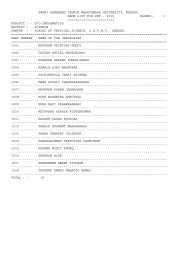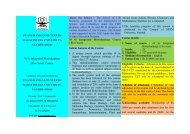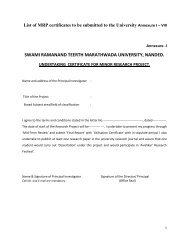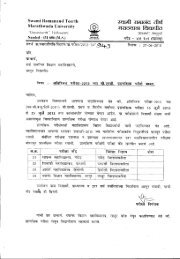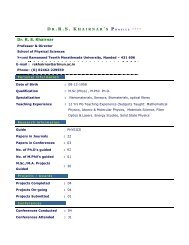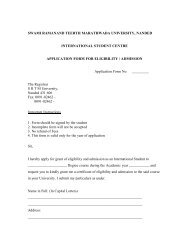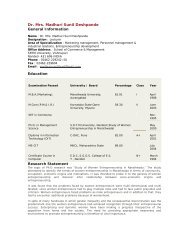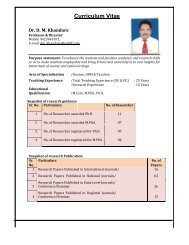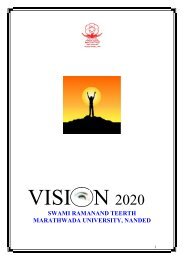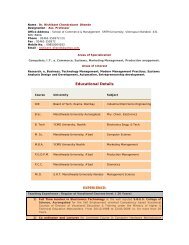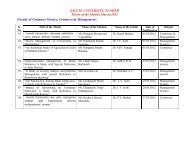MA - The Swami Ramanand Teerth Marathwada University
MA - The Swami Ramanand Teerth Marathwada University
MA - The Swami Ramanand Teerth Marathwada University
Create successful ePaper yourself
Turn your PDF publications into a flip-book with our unique Google optimized e-Paper software.
SWAMI RA<strong>MA</strong>NAND TEERTH <strong>MA</strong>RATHWADA<br />
UNIVERSITY, NANDED<br />
STRUCTURE AND SYLLABUS<br />
For award of degree<br />
Master of Arts in Education<br />
Introduced from Academic year 2009 onwards<br />
And<br />
Subject to revise from time to time<br />
JULY -2009<br />
1
Contents:<br />
1. <strong>The</strong> General Objectives Of M.A. ( Education) Course Are :<br />
2. Duration of the Course<br />
3. Eligibility For Admission<br />
4. Structure of the M.A. ( Education)<br />
5. Attendance<br />
6. Scheme of Examination<br />
7. <strong>The</strong> Examination For <strong>The</strong> Degree Of M.A. (Education) Course<br />
Shall Be By Papers, Practicals, Seminar, Project, Field Based<br />
Experience, Dissertation And Viva-Voce<br />
8. Standard of Passing<br />
9. Conversion of Marks Into Grade -Point, Letter- Grade And Class<br />
10. <strong>The</strong> Marks Certificate<br />
11. (Improvement Of Class)<br />
12. Repeater Rules<br />
13. Detail Syllabus<br />
a. Semester I<br />
b. Semester II<br />
c. Semester III<br />
d. Semester IV<br />
Introduction:<br />
2
<strong>Swami</strong> <strong>Ramanand</strong> <strong>Teerth</strong> <strong>Marathwada</strong> <strong>University</strong>, Nanded is introducing<br />
a new post graduate course Master of Arts (Education) in the Faculty of<br />
Education from academic year 2009. This course is equivalent to M.Ed.<br />
program that already being run in the jurisdiction. M. A. Education will<br />
have good prospectus in teacher Education institutions and other<br />
Educational organizations. Course structure and syllabus for this is<br />
formed with following objectives.<br />
<strong>The</strong> General Objectives of M.A.(Education) Course are as<br />
1. To prepare professional personnel required for staffing of the<br />
Colleges of Education.<br />
2. To prepare administrators and supervisors for schools and for<br />
positions of responsibilities in the Education Department at<br />
Institutions engaged in Educational Research and Educational<br />
planning.<br />
3. To prepare personnel for various educational services.<br />
4. To enable to understand, analyse, evaluate Philosophical, Social,<br />
Economic, Cultural, Psychological concern of Education.<br />
Duration of the Course<br />
<strong>The</strong> course for the Master of Arts (M.A.-Education) Regular,<br />
semester Pattern shall be of two academic year having four<br />
semesters. <strong>The</strong> Terms and vacations of the course shall be as<br />
prescribed by the <strong>University</strong> from time to time.<br />
Eligibility for Admissions:<br />
a. A candidate, who has passed the B.Ed., Examination of this<br />
<strong>University</strong> or any other <strong>University</strong> recognized as equivalent there<br />
to shall be eligible for admission to the course, provided he/she has<br />
secured at least 50% of the marks in the theory part. In the case of<br />
SC/ST students this percentage of marks shall be at least 45%.<br />
3
. Provisional admission of candidates shall be given based on the<br />
criteria and the guidelines issued by the university in this respect<br />
from time to time.<br />
c. <strong>The</strong> reservations will be given as per the policy and guidelines<br />
Medium:<br />
prescribed by <strong>University</strong> and government, subject to revision by<br />
the university from time to time.<br />
a. Medium of Instruction: - <strong>The</strong> medium of instruction for this course<br />
will be Marathi or English. Concerned<br />
department can make arrangement and is<br />
permitted to do so by the <strong>University</strong>.<br />
b. Medium of Dissertation: - <strong>The</strong> students, with preceding permission,<br />
have option of medium for the submission of<br />
the dissertation as - Marathi or English.<br />
irrespective of the medium of Instruction, but<br />
not different from the medium of the<br />
Examination.<br />
c. Medium of Examination:-<strong>The</strong> medium of the Examination shall be<br />
Attendance<br />
Marathi or English.<br />
a. A candidate desiring to appear for the M.A. (Education)<br />
examination must attend the College recognized for this<br />
purpose.<br />
b. In each semester in each paper/practical/ activities/seminar a<br />
student should put-in at least a minimum 75% attendance,<br />
subject to the general provisions existing in the <strong>University</strong><br />
for condonation of attendance, provided a student who falls<br />
short of the required minimum of attendance in the first or<br />
4
second semester shall make good the same in the next year I<br />
semester and II semester term as the case may be.<br />
c. Student shall attend the lectures and undertake activities<br />
(Components under each Head) of the course in each<br />
semester as prescribed by the <strong>University</strong>.<br />
d. In case a student remains absent for a particular component<br />
Course Structure:<br />
he/she will have to make good the same in subsequent year.<br />
<strong>The</strong> course is structured by following heads:<br />
Semester wise details of course are as-<br />
Semester I:<br />
<strong>The</strong>ory Title Marks<br />
Papers<br />
Internal External<br />
<strong>MA</strong>E-01 Philosophical & Sociological 20 80<br />
Foundations of Education<br />
<strong>MA</strong>E-02 Psychological Foundation of Education 20 80<br />
<strong>MA</strong>E-03 Methodology in Educational Research 20 80<br />
<strong>MA</strong>E-04<br />
Semester II<br />
Teacher Education 20 80<br />
<strong>The</strong>ory Title Marks<br />
Papers<br />
Internal External<br />
<strong>MA</strong>E-05 Philosophical & Sociological 20 80<br />
Foundations of Education<br />
<strong>MA</strong>E-06 Psychological Foundation of Education 20 80<br />
<strong>MA</strong>E-07 Methodology in Educational Research 20 80<br />
<strong>MA</strong>E-08<br />
Semester III<br />
Teacher Education 20 80<br />
<strong>The</strong>ory Title Marks<br />
Papers<br />
Internal External<br />
<strong>MA</strong>E-09 Educational<br />
Management<br />
Administration & 20 80<br />
<strong>MA</strong>E-10 Education Technology 20 80<br />
<strong>MA</strong>E-11 Elective related to School subject 20 80<br />
Pedagogy<br />
<strong>MA</strong>E-12 Practicum & Field study 100<br />
Total 400<br />
Note: From three elective related to school subject pedagogy papers one should<br />
be selected related to paper no. <strong>MA</strong>E-11 for semester third.<br />
Head<br />
<strong>MA</strong>E-12 Practical & Field Study Marks<br />
5
1 Practise teaching observation ( minimum 5 lessons)<br />
Extension/ Community work related to Health,<br />
nutrition, cleanliness, literacy and other educational<br />
20<br />
2 issues 15<br />
3 Internship at Teacher Education Institutions ( 3 days) 30<br />
4 Seminar on Comprehensive issues<br />
Paper presentation at state/ National level ( minimum<br />
15<br />
5 1 during the period of course) 20<br />
Total 100<br />
Semester IV<br />
<strong>The</strong>ory Title Marks<br />
Papers<br />
Internal External<br />
<strong>MA</strong>E-13 Educational Measurement & Evaluation 20 80<br />
<strong>MA</strong>E-14 Special Education 20 80<br />
<strong>MA</strong>E-15 Elective Group A (Candidate has to opt<br />
any one )<br />
20 80<br />
<strong>MA</strong>E-16 Elective Group B (Candidate has to opt<br />
any one )<br />
20 80<br />
Dissertation and viva-voce 100<br />
Total<br />
Note:<br />
500<br />
1. From elective group A one paper should be selected for paper no. <strong>MA</strong>E-<br />
15 and elective group B one paper should be selected for paper no <strong>MA</strong>E-<br />
16 for semester fourth.<br />
2. Dissertation topic will be decided through discussion with teachers of<br />
concerned colleges and they have to take care of avoiding repetition of<br />
topic or plagiarism.<br />
Scheme of Examination<br />
<strong>The</strong> examination for the degree of M.A. (Education) course shall be both<br />
Grand Total:<br />
Semester I (400) + Semester II (400) + Semester III (400) + Semester IV (500) = 1700<br />
External & Internal modes. External exam will be arranged by <strong>University</strong>.<br />
Internal assessment is to be followed by own mechanism of school.<br />
External referee for viva voce will be appointed by <strong>University</strong>.<br />
Standard of passing:<br />
Standard of passing will be as per rules of university applicable to all PG<br />
of the concern faculty.<br />
Improvement of class:<br />
Persons who hold Second class at the M.A. Education & who appear for<br />
the same examination in the same subjects in order to improve their class<br />
6
to secure higher Second Class shall be allowed to do so as per the<br />
provisions of the following rules :-<br />
1. <strong>The</strong> concession to re-appear will be available only to the holders of the<br />
Master's degree of this <strong>University</strong>.<br />
2. Persons holding M.A. Education degree of this <strong>University</strong> in the<br />
second class & desirous of reappearing for the same examination for<br />
improvement of class shall be given three chances to do so within a<br />
period of six years from his/her first passing the said examination in the<br />
second class.<br />
3. <strong>The</strong> students who reappear for examination for improvement of class<br />
will be required to appear for a minimum of 2 theory papers at a time.<br />
A candidate passing any of the post-graduate examination above under<br />
these rules shall be not eligible to receive any prize, scholarship etc.<br />
instituted by the <strong>University</strong> & he/she shall also not be entitled to a merit<br />
certificate from the <strong>University</strong>. If a candidate is unable to get a higher<br />
class under this scheme, his/her previous performance in the<br />
corresponding examination shall hold good.<br />
SEMESTER I<br />
PHILOSOPHICAL AND SOCIOLOGICAL FOUNDATIONS OF<br />
EDUCATION<br />
___________________________________________________________<br />
Objectives of Paper:<br />
1. To enable the student to understand the philosophical and<br />
sociological origins of education.<br />
2. Logical analysis, interpretation and synthesis of various concepts,<br />
proposition and Philosophical assumptions about educational<br />
phenomena.<br />
7
3. To help the student to develop a philosophical and sociological<br />
outlook towards educational problems.<br />
4. Critical appraisal of contributions made to education by prominent<br />
educational thinkers<br />
___________________________________________________________<br />
Content of Paper:<br />
UNIT I: INTRODUCTION TO PHILOSOPHY OF EDUCATIONAL.<br />
1. Philosophy – meaning, need, its Nature and functions.<br />
2. Philosophy of Education – meaning & scope<br />
3. Nature of Philosophy of Education: A directive Discipline, Liberal<br />
Discipline, An activity<br />
4. Functions of Philosophy of Education : Speculative, Analytic ,<br />
Normative<br />
5. Understanding Nature & Functions of Philosophy with respect to<br />
aspects : like Aims and Objectives, Methods of Teaching,<br />
Curriculum, Text Book, Teacher-Pupil Relationship, Discipline ,<br />
methods of evaluation<br />
UNIT 2: PERSPECTIVES OF PHILOSOPHY OF EDUCATION:<br />
1. Western Schools: Idealism, Realism, Naturalism, Pragmatism and<br />
Existentialism: concepts of knowledge, reality and values; their<br />
educational implications for aims, contents and methods of<br />
education.<br />
2. Indian Schools: Vedanta, Buddhism, Jainism and Islam: concepts of<br />
knowledge, reality and values; their educational implications for<br />
aims, contents and methods of education.<br />
UNIT 3: PHILOSOPHY OF EDUCATION AND DEVELOPMENT:<br />
8
Educational thoughts and practices made by great thinkers like<br />
Vivekananda, Tagore, Gandhi and SriAurobindo and critical<br />
appreciation of their contribution with reference to their views on –<br />
a) Concept of Man and his Development<br />
b) Socio-cultural scenario, a global perspective.<br />
UNIT 4: INTRODUCTION TO SOCIOLOGY OF EDUCATION:<br />
1. Relationship of Sociology and Education<br />
2. Meaning and nature of Educational sociology and Sociology of<br />
education<br />
3. Education-as social sub-system-specific characteristics.<br />
4. Social Process like Socialisation, Stratification, Social Change,<br />
social mobility; their meaning, nature, role, constraints and relation to<br />
education<br />
UNIT 5: EMERGING TRENDS IN SOCIETY AND EDUCATION<br />
Emerging trends in society, their meaning, nature, scope and impact on<br />
education regarding aims of education, curriculum, role of teacher,<br />
student teacher relations, Methods of teaching and Evaluation.<br />
Emerging Trends:<br />
1. Knowledge Society<br />
2. Education for Sustainable Development<br />
3. Liberalization<br />
4. Privatization<br />
5. Globalization<br />
6. Multicultural Society<br />
7. Open and Distance Education<br />
Practicum: (any one)<br />
1. Identifying the educational problems of socially deprived students and<br />
preparing and implementing a compensatory programme for them.<br />
9
2. Reflective writing, in about 1000 words, on educational thoughts of<br />
any one educationist not included in curriculum<br />
SEMESTER II<br />
UNIT I: FIELDS OF PHILOSOPHICAL INQUIRY<br />
1. Metaphysics and Education<br />
2. Epistemology and Education<br />
3. Axiology and Education<br />
Meaning, Nature , limitations , significance and impact on aspects of<br />
education like Aims and Objectives, Methods of Teaching,<br />
Curriculum, Text Book, Teacher-Pupil Relationship, Discipline ,<br />
methods of evaluation with reference to various Indian and western<br />
school.<br />
UNIT II : PHILOSOPHY OF EDUCATION AND EVELOPMENT:<br />
Educational thoughts and practices made by great thinkers like Plato,<br />
John Dewey, Kant and critical appreciation of their contribution with<br />
reference to their views on –<br />
a) Concept of Man and his Development<br />
b) Socio-cultural scenario, a global perspective.<br />
UNIT III: CURRENT CHALLENGES IN EDUCATION<br />
a. Women Empowerment through Education : Gender Disparities,<br />
Women empowerment – need & Role of Education<br />
b. Education in multicultural society.<br />
c. Parent Education: Meaning, need and scope, Parent-Teacher<br />
Associations & their functions, main features of Parent Education<br />
Programmes<br />
10
UNIT IV: IMPACT OF SOCIO – ECONOMIC – POLITICAL<br />
IDEOLOGIES AND EDUCATION<br />
a) Impact of Individualism<br />
b) Impact of Fascism<br />
c) Impact of communism<br />
d) Philosophy of Emerging Indian Society and Education: Meaning and<br />
Characteristics of Democracy, Socialism and Secularism and<br />
Role of Education with reference to them<br />
UNIT V: SOCIAL RELATES OF EDUCATION<br />
Education and Family<br />
Education and Schooling<br />
Education and Peer group<br />
Education and culture in general<br />
Education and religion, Caste, Gender, Class<br />
Education for Weaker Sections<br />
PRACTICUM (ANY ONE)<br />
1. Write your statement of Educational Philosophy in 5oo words<br />
2. Conduct a survey regarding educational issues of your locality<br />
References:<br />
Altekar, (1975). Education in Ancient India (7thEd.). Varanasi : Monohar<br />
Prakashan.<br />
Ambedkar ,B.R., (1956). Goutam Buddha and His Dhamma. Delhi :<br />
Government Press.<br />
Bhatia, B.D., (1970). <strong>The</strong>ory and Principles of Education (11th Ed). New<br />
Delhi : Doaba House.<br />
Bron., F. J., (1970). Educational Sociology. New Delhi : Prentice Hall,<br />
Inc.<br />
11
Brubacher, J.S., (1969). Modern Philosophies of Education. New York :<br />
Mc Graw Hill Co. Inc.<br />
Pandey, Sanjay (2004). Peace Education. New Delhi: NCERT.<br />
Perters, R. S., (1973). Authority, Responsibility & Education (3rd Ed).<br />
London : George, Allen & Unwin.<br />
Pratle, R. (1997). Ideology & Education. New Delhi : David Macky Co.<br />
Price, Monroe & Thomson, Mark (2003). Forging Peace, Bloomington in<br />
47404- 3797 : Indian <strong>University</strong> Press 60/ North Morton street.<br />
Rusk, R. P., (1929). Philosophical Basis of Education. London : Warnick<br />
<strong>University</strong> Press Ltd.<br />
Saiyaddin, K. G., (1948). Education for International Understanding.<br />
Bombay : Hind Kitab.<br />
Taj, Haseen ( 2005). current challenges in Education. Hyderabad<br />
:Neelkamal<br />
vdksGdj x +fo- laiknd ¼1994½ frljh vko`Rrh ^ xka/kh fopkj n+'kZZu*<br />
[kaM 1 rs 12<br />
iq.ks % i`Foh izzdk'ku<br />
cksdhy fo +ik +¼1967½ *f'k{k.kkps rRoKku* ¼nqqljh<br />
vko`Rrh½ iq.ks % fp='kkGk izsl<br />
csdj<br />
tkWuW- ,l- ¼1971½ *vk/kqqfud<br />
f'k{k.kkph rRoKku* vuqqqoknd<br />
vkdksGsdj x + +fo iq.ks % Jh<br />
fo/kk izzdk'ku<br />
] 'kfuokj isB +<br />
dqaMys ]e-a-a ck-¼2000½ *'kS{kf.kd rRoKku o 'kS{kf.kd lekt'kkL=* iq.ks egkjk"V fon;k<br />
izzdk'ku-+<br />
Hkkslys f'kokthjko ¼1984½ ^eqqfDrxkFkk<br />
egkekuokph *iw.wkZZ;ksxh<br />
Jh vjfoana% thou o<br />
rRoKku iq.ks % vuekssy<br />
izdk'ku-<br />
esgasasnGs<br />
]; Jh- lekt'kkL+=+ph ewwyrRos<br />
iq.ks esgasnasasG<br />
izzdk'ku+<br />
ukjk;.k isB +<br />
ikjlful u- jk- f'k{k.kkph rkfRod o lekt'kkL+=+=kh; Hkwwfedk*<br />
uwwru<br />
izdk'ku iq.ks & 30-<br />
fnf{kr Jhfuokl ¼1975½ ^Hkkjrh; rRoKku* ukxiwj lqqfopkj<br />
izzdk'ku<br />
eaMG<br />
tkss'kh<br />
xtkuu ¼1994½ ^Hkkjrh; rRoKkukpk c``gnbfrgkl* ¼[kaM 1 rs 6½ iq.ks ejkBh<br />
rRoKku egkdks'k eaMG-<br />
12
SEMESTER I<br />
PSYCHOLOGICAL FOUNDATIONS OF EDUCATION<br />
Objectives of Paper:<br />
1. To enable the student to understand concepts and principles of<br />
Educational Psychology as an applied science.<br />
2. To enable the leaner to understand implications of psychological<br />
theories for education.<br />
3. To acquaint the learner with the process of development and<br />
assessment of various abilities and traits<br />
Content:<br />
UNIT I : EDUCATIONAL PSYCHOLOGY AN INTRODUCTION<br />
• Educational Psychology : Concept, concerns and scope of educational<br />
psychology,<br />
contribution of psychology to education<br />
UNIT II : HU<strong>MA</strong>N DEVELOPMENT<br />
• Human Development : Concept, principles, sequential stages of<br />
development; factors influencing d<br />
evelopment and their relative role; general characteristics and problems of<br />
each stage.<br />
• <strong>The</strong>ories of Piaget and Bruner – major concepts and stages and<br />
implications for<br />
education. • Indian theory of Psychological Development.<br />
UNIT III : THEORIES OF LEARNING<br />
• Learning : Concept, kinds, levels of learning various view points on<br />
learning, Gagne’s conditions of learning; cognitive view point and<br />
information processing; issues related to learning. Educational<br />
implications of the view points on learning.<br />
UNIT IV : GROUP DYNAMICS<br />
• Group Dynamics: Group process, interpersonal relations, sociometry<br />
grouping, Social-Emotional climate of the classroom and influence of<br />
teacher characteristics.<br />
13
UNIT V : INDIVIDUAL DIFFERENCES<br />
• Individual Difference: Concept of intra and inter differences:<br />
a) Intelligence and cognitive abilities, identification fostering<br />
b) Creativity – Nature, Process, Identification, fostering and Guiding<br />
creative children.<br />
c) Interests, attitude and values<br />
d) Adjustment of teaching – learning process to suit individual<br />
differences – learning styles and teaching strategies.<br />
Practicum (any one)<br />
1. Preparing a lesson plan incorporating the various psychological<br />
principles<br />
2. Administering any one psychological test to 5 peers and writing a<br />
report.<br />
SEMESTER II<br />
UNIT I: THEORIES OF PERSONALITY<br />
• Personality: Concept, development, structure and dynamics of<br />
personality<br />
• <strong>The</strong>ories of Personality – Allport, Eysenck; Psychoanalytic approach of<br />
Freud, Erickson;<br />
Behavioural approach – Miller, Dollard and Bandura, Humanistic<br />
approach – Rogers, Maslow<br />
UNIT II: INDIAN PERSPECTIVES OF PERSONALITY<br />
: Vedic, Buddhist, Rabindernath Tagore Mahatma Gandhi,<br />
J.Krishnamurti and Sri Aurobindo<br />
UNIT III: MEASUREMENT OF PERSONALITY<br />
• Assessment of Personality – Techniques<br />
a) Personality inventories – rating scales<br />
b) Projective techniques : Rorchach, TAT<br />
UNIT IV : ADJUSTMENT AND MENTAL HEALTH<br />
• Adjustment and Mental Health<br />
a) Concept, mechanism of adjustment – defence; escape, withdrawal,<br />
compensatory.<br />
b) Introduction to common forms of neuroses, psychosis and somatic<br />
disorders<br />
14
c) Principles of mental hygiene – preventive, constructive, curative<br />
measures,<br />
d) Implications for education<br />
Practicum: (any one)<br />
References:<br />
1. Prepare two case studies regarding various factors of<br />
personality<br />
2. Organise a programme for mental health and report the<br />
outcomes<br />
Baron, Robert A, (2003). psychological (3rd ed). New Delhi, 110092 :<br />
Prentice Hall of India.<br />
Baron, Robert A, ( 2003). Social psychology (10th ed). New Delhi :<br />
Prentice Hall of India .<br />
Berk,Laura E, (2003). Child Development (6th ed). New Delhi : Prentice<br />
Hall of India<br />
Benjamin, W.B., (1985). Hand book of Human Intelligence:<strong>The</strong>ories,<br />
Measurement and Application John, London : Wiley of Sons Inc.<br />
Beveridge, WIB, (1980). Seeds of Creativity London : Heinemann<br />
Educational Book Ltd.<br />
Chauhan, S.S., (1983). Psychology of Adolescence. New Delhi: Allied<br />
Publication.<br />
Dandapani, S.,(2000). Textbook of Educational Psychology. New Delhi:<br />
Anmol Publications Pvt. Ltd., 434/4B, Ansari road, Daryaganj, 110092.<br />
Devas, R.P., Jaya N. (1984). A Text Book on Child Development.<br />
Bombay : McMillan India Ltd.<br />
Fisher, Ronald j. (1982). Social Psychology, An Applied Approach. New<br />
York : St. Martins Press.<br />
Hilgad, E.R. And Bower, G.H., (1977). <strong>The</strong>ories of Learning. New Delhi<br />
:Prentice Hall of India Ltd.<br />
Jangira, N.K., etal (1991). Functional Assessment Guide. New Delhi :<br />
NCERT.<br />
Kuppuswami, B. (1967). An Introduction to Social Psychology. Bombay<br />
: Asia Publishing House.<br />
Shriwasthav, Prakash G.N., (1987). Recent Trends in Educational<br />
Psychology. Agra: Psychological Research Cell.<br />
Educational Psychology (Contribution & Great Psychologist (2008), Dr Lahorkar<br />
B.R., Dr.Joshi D.B. Dr.Sadavarte U.K. Aditya Publication<br />
jk- jk- ckiV vkf.k Hkkos ¼1973½ *f'k{k.kkps ekul'kkL=kh; vf/k"Bku* iq.ks % Jh fo|k<br />
15
izdzdk'ku- +<br />
dqyqyd.khZ ds + fo + *'kS{kf.kd ekul'kkL=kiqq.ks<br />
% Jh fo|k izdzdk'ku- +<br />
[kjkr vk +ik +¼1974½ *izzxr<br />
'k{S{S kf.kd ekul'kkL=k* iq.q.k s % Jh fo|k izdzdk'ku- +<br />
txrki g +u+uk + ¼1990½ *'k{S{S kf.kd o izkzkzk;ksfsfsfxd ekul'kkL=k* iq.q.k s % Jh fo|k<br />
izdzdzdk'ku- +<br />
t;Lokt lhrkjke ¼1990½ *Hkkjrh; euksfsfoKku* uoh fnYyh %vk;Z cqqd<br />
Msiks<br />
t+xrki g-+ +uk ¼1990½ *v/;;u mRiRrh o v/;kiu* iq.ks % uwwru<br />
izzdk'ku<br />
nkaMssdj<br />
ok +uk + ¼1998½ *'kS{kf.kd o izkzk;ksfsfxd ekul'kkL= iq.ks % eks?ks izdk'ku +<br />
izKk ekul la'kksfsf/kdk ¼1992½ cqf}oSHko iq.ks Kkuicksfsf/kuh<br />
cksjkMs jk j a dqqeBssdj<br />
ess?kk<br />
o brj ¼1990½ *oSdkfld ekul'kkL=* iq.ks fo|kFkh Z x`g-<br />
Jh vjfoan ¼1969½ *;ksx leUo; ikSMspspjh* % Jh vjfoana lkslk;Vh<br />
SEMESTER I<br />
METHODOLOGY OF EDUCATIONAL RESEARCH<br />
Objectives of Paper:<br />
To enable the students to understand :<br />
1. <strong>The</strong> meaning of scientific method, scientific inquiry, Paradigm, theory<br />
and this implications for educational research.<br />
2. <strong>The</strong> characteristics of philosophical, psychological and sociological<br />
researches in education.<br />
3. <strong>The</strong> different strategies of educational research.<br />
4. <strong>The</strong> techniques of developing a research proposal.<br />
5. <strong>The</strong> meaning and techniques of sampling<br />
6. <strong>The</strong> various types of tools of data collection.<br />
Content:<br />
UNIT I : EDUCATIONAL RESEARCH: AN INTRODUCTION<br />
Nature of Research, knowledge and Inquiry.<br />
Scientific inquiry, scientific method, nature and sources of<br />
knowledge.<br />
Paradigm, theory, model and approach; positivist and nonpositivist<br />
(humanities)<br />
paradigms and their implications for educational research.<br />
UNIT II : FOUNDATIONS OF RESEARCH<br />
Philosophical, psychological and sociological orientation in<br />
educational research.<br />
Interdisciplinarity in educational research and its implications.<br />
16
UNIT III : METHODS OF EDUCATIONAL RESEARCH<br />
• Experimental; Normative Survey; Historical’ Case Study; Development;<br />
Ethnographic; Documentary-analysis .<br />
• Evaluative Research and Action Research<br />
UNIT IV : Developing a Research Proposal<br />
Problem and its sources; Selection and Definition of problem.<br />
Objectives – primary, secondary and concomitant<br />
Hypothesis – nature, definition, types, sources, characteristics of a<br />
good hypothesis; directional and non-directional hypothesis.<br />
UNIT V :TOOLS AND TECHNIQUES OF DATA COLLECTION<br />
Observation; Interview; Sociometric techniques.<br />
Questionnaire, Rating scales; Interview schedules Attitude scales<br />
etc.<br />
Reliability and validity of various tools and techniques.<br />
PRACTICUM (any one)<br />
• Development of a research proposal for MEd. Dissertation and its<br />
seminar– presentation.<br />
• Construction of one tool of data collection.<br />
SEMESTER II<br />
UNIT I : DATA ANALYSIS AND PRESENTATION<br />
Nature of educational data : Quantitative and Qualitative dara<br />
Qualitative data : its analysis with emphasis on content analysis;<br />
analysis of interviewbased data and observation based data.<br />
Quantitative data : Scales of measurement : nominal, ordinal,<br />
internal, Ratio.<br />
Organization and representation : Frequency distribution.<br />
Frequency polygon,<br />
Histogram, Ogive, Smoothed frequency curve.<br />
UNIT II: DISCRIPTIVE STATISTICS<br />
Concept, calculation and uses of : Measures of central tendencies,<br />
a) Measures of variability.<br />
b) Percentiles and Percentile Ranks.<br />
c) Correlations, Regression equations<br />
Properties and uses of normal distribution<br />
UNIT III INFERENTIAL STATISTICS<br />
17
Standard errors, confidence limits<br />
Hypothesis testing Difference between means, correlations, Cross<br />
breaks (Chi-square) ,ANOVAnal<br />
Application of statistical tests and their interpretation<br />
UNIT IV : VALIDITY OF FINDINGS<br />
Validity and Limitations of findings; factors influencing validity of<br />
research; internal vs. external validity; how to increase validity of<br />
research findings.<br />
UNIT V : RESEARCH REPORTING<br />
Research report: sections (Preliminary part, main body, reference<br />
section)<br />
Skills of writing research report:<br />
Evaluation of Research: Criteria and types and types of research.<br />
Practicum: (any one)<br />
1. Review of two published research papers; one quantitative and the<br />
other qualitative.<br />
2. Evaluation of an MEd or an M.Phil. Dissertation.<br />
References<br />
Agrawal, J. C. (1968). Educational Research. New Delhi : Arya Book<br />
Depot.<br />
Best, J. W. (1982). Research in Education. New Delhi : Prentice Hall of<br />
India Pvt. Ltd.<br />
Campbell, W.G. etal (1968). Form & Style in <strong>The</strong>sis. Boston : Writing<br />
Houshton Mifin Co.<br />
Coery, (1953). Action Research to Improve School Practices. New York :<br />
Teachers College, Columbia <strong>University</strong>.<br />
Garrertt, H. E., (1981). Statistics in Psychology & Education. Vakits<br />
Feffer & Simons Ltd.<br />
Guilford, J. P., (1950). Fundamental Statistics in Psychology &<br />
Education. McGraw Hill Book Com.<br />
Good & Scates. Methods of Research.<br />
Fox, D. J., <strong>The</strong> Research Process in Education. (Holt).<br />
Kual, Lokesh (1988). Methodology of Educational Research. New Delhi<br />
:Vikas Publishing House Pvt.<br />
Robert, M. W., Travers. An Introduction of Educational Research. New<br />
York : <strong>The</strong> McMillan Company.<br />
Sukhia, Mehrotra & Mehrotra (1970). Elements of Educational Research :<br />
Alied Publishers Ltd.<br />
18
Kerlenger, F. Fundamentals of Behavioural Research.<br />
Tuckman, Bruce W., (1978). Conducting Educational Research. New<br />
York: Harcourt Barce Javanovich Ing.<br />
eqqGs<br />
jk + 'k + o mekB s fo + rq + 1977 'kS{kf.kd l'kk/kukph ewyrRo s ukxiwjw % egkjk"V<br />
fo|kihB xzaFzk fufeZrh eaMG +<br />
ns'kikaMs izzdk'k<br />
vkf.k iaMhr cUlhfcgkjh 1995 'kS{kf.kd d`rh laa'ks/ku iq.ks % uwru<br />
f”k{k.kkrhy uoizorZus 20008] MkW- izeksn tks”kh]izk- egs”k dGykos] vkfnR; izdk”ku] uaknsM<br />
SEMESTER I<br />
Objectives of Paper:<br />
To enable the student to:<br />
TEACHER EDUCATION<br />
1. Understand the philosophical foundation of teacher education.<br />
2. Acquaint with aims, objectives, structure and curriculum of teacher<br />
education.<br />
3. Trace the development of teacher education in India & West.<br />
6. Understand the thinking process of a teacher.<br />
7. Become acquainted with managerial aspects of various Practicals in<br />
teacher education.<br />
Content:<br />
UNIT- I PHILOSOPHICAL FOUNDATION OF TEACHER<br />
EDUCATION<br />
a. Concept, Aims and General objectives of Teacher Education<br />
b. Objectives of Teacher Education at various Levels<br />
c. Schools of Philosophy, Psychology and their Implications for Teacher<br />
Education<br />
i) Behaviouristic ii) Humanistic iii) Constructivistic iv) System Approach<br />
e. Ethics of shaping another Person’s Behaviour<br />
UNIT- II DEVELOPMENT OF TEACHER EDUCATION<br />
19
a. History of Teacher Education in West and India: Qualitative and<br />
quantitative growth<br />
b. Reports of National Commissions on Education - (with reference to<br />
Teacher Education only)<br />
c. Reports of International Commissions on Education - (with<br />
reference to Teacher Education only)<br />
d. Agencies of Teacher Education, their functions and role with<br />
reference to NCTE, UGC, NAAC, NCERT, SCERT, <strong>University</strong><br />
Faculty of Education, Academic Staff Colleges, Open<br />
Universities.<br />
UNIT- III STRUCTURE AND CONTENT OF TEACHER<br />
EDUCATION<br />
a. Pre-service and In-service Teacher Education: Meaning, rationale,<br />
need.<br />
b. Structure and content of Pre-service and In-service Teacher<br />
Education at various levels.<br />
c. General Components: <strong>The</strong>ory, Practical activities, Laboratory<br />
experiences, Practice Teaching, Field Experiences and Internal<br />
assessment: Nature, need, interrelations , constraints and quality<br />
management<br />
UNIT- IV: PROCESS OF BECOMING A TEACHER<br />
a. Contexts of Becoming a Teacher –<br />
i) Personal Context ii) Teacher Educator’s Context<br />
iii) Client Context iv) Research Context<br />
b. Teacher Professionalism – Roles, Attitudes, Values, Job<br />
Satisfaction<br />
c. Role of Teacher Education in shaping the behavior<br />
d.<br />
20
e. of Teacher and Professionalizing a Teacher<br />
f. Role of In service Teacher Education in shaping the<br />
teachers behavior and professionalizing a teacher<br />
UNIT V: RESEARCHES IN TEACHER EDUCATION<br />
a. Fundamental and applied researches in Teacher Education in India<br />
and in other countries<br />
b. Areas of researches: Teaching Effectiveness, Criteria of<br />
admission, Modification of Teacher behaviour, School<br />
effectiveness, classroom processes, teacher competencies &<br />
Values.<br />
Practicum (any one)<br />
1. Prepare a tool for observation or measurement of any<br />
one field activity like practice teaching, internship etc.<br />
2. Critical analysis of curriculum of teacher education program<br />
at various level.<br />
Objectives of Paper:<br />
To enable the student to:<br />
SEMESTER II<br />
TEACHER EDUCATION<br />
1. Understand the philosophical foundation of teacher education.<br />
2. Acquaint with aims, objectives, structure and curriculum of teacher<br />
education.<br />
3. Trace the development of teacher education in India & West.<br />
6. Understand the thinking process of a teacher.<br />
7. Become acquainted with managerial aspects of various Practicals in<br />
teacher education.<br />
21
UNIT I TEACHER THOUGHT PROCESS<br />
a. Concept of Teaching & Learning<br />
b. Relationship among Learning, Teaching and Teacher Education<br />
c. 3 Ps in Teaching – Perception, Planning and Performance<br />
d. Principles of planning, guiding for planning and procedure of feed<br />
back<br />
e. Teacher Thought process and Decision making<br />
UNIT II: PRACTICE TEACHING IN TEACHER EDUCATION<br />
f. Demonstrations<br />
g. Experimentation<br />
h. Practice teaching and observations<br />
i. Significance and Supervision of Practice teaching<br />
j. Internship<br />
k. Relationship of College of Education with Co-operating Schools<br />
UNIT III : EVALUATION PROCEDURES IN TEACHER<br />
EDUCATION<br />
a. Internal Assessment<br />
b. Aspect of Internal Assessment<br />
c. Weightage for Internal assessment<br />
d. New techniques of Evaluation<br />
e. External Evaluation<br />
f. Practice Teaching – Final Lesson<br />
g. <strong>The</strong>ory papers<br />
UNIT IV: CURRENT PROBLEMS, FUTURE PRIORITIES<br />
c. Teacher Education in the context of 21 st century and Current<br />
issues in Teacher Education<br />
d. Preparing teachers for special schools and inclusive education<br />
e. Modification of teacher behaviour and teacher characteristics<br />
22
f. Technological, Managerial, Pedagogical Trends in Teacher<br />
Education.<br />
UNIT V : TEACHER EDUCATION AS A PROFESSION:<br />
g. Professional organizations for various levels of teacher-types and<br />
there role & functions<br />
h. Performance appraisal of teacher educator<br />
i. Code of conduct and ethics of teacher education profession.<br />
j. Faculty improvement programme for teacher Education.<br />
Practicum: (any one)<br />
1. Organise a work shop/ seminar on any theme related to teacher<br />
education<br />
2. Make a case study of a teacher education college<br />
References:<br />
Anderson, L.W. & etal. Ed. (1997). Internetinal Encyclopedia of<br />
Teaching & Training Education: Pergamon Press.<br />
Biddle, B. J. etal. (1997). Internatiel Handbook of Ds & Teaching Vol I +<br />
II. Boston : Kular Academic Publication.<br />
Borich, G.D. (1997). Appresal of Teaching : Concept & Process: Addison<br />
Weslery ublishing Co. Reading Massachusetts.<br />
Brown, G Microteaching (1975). A Programmer of Teaching Skills.<br />
London : Methuen & Co. Ltd.<br />
Buch, M. B.,(Ed.) (1971). First Survey of Research on Education. Baroda<br />
: SERD.<br />
Buch, M. B.,(Ed.) (1979). Second Survey of Research on Education.<br />
Baroda : SERD.<br />
SEMISTER III<br />
EDUCATIONAL <strong>MA</strong>NAGEMENT AND ADMINISTRATION<br />
23
Objectives of Paper:<br />
1. To help the students to understand the concepts, principles processes and<br />
techniques of management of education scientifically.<br />
2. To acquaint the students with some management skills required in the educational<br />
environment.<br />
3. To enable the students to apply the concepts, techniques and processes of<br />
management to the situations in education.<br />
4. To orient the students with the procedures of supervision and inspection and bring<br />
about improvement in the field of education.<br />
Content:<br />
Unit 1: Concept and Meaning of Educational Management<br />
1. Educational Management: Concept, Nature, importance<br />
2. Trends in management ( concept, Nature and importance)<br />
Human Resource Management<br />
Performance Appraisal<br />
Time Management<br />
Unit 2: Concept and Meaning of Educational Administration<br />
1. Development of Modern Concept of Educational Administration from 1900 to<br />
Present-day.<br />
2. Taylorism<br />
3. Administration as a process<br />
4. Administration as a bureaucracy<br />
5. Meeting the Psychological needs of employees, systems approach<br />
6. Administration such as (a) Decision making, (b) PERT,<br />
UNIT 3: Structural Framework of Educational Management in India<br />
1. Agencies of educational Management – U.G.C., NCERT, NIEPA, CABE,<br />
NCTE, IGNOU (Genesis, objectives, functions and role)<br />
24
2. Management of Schools : Role of headmaster in planning of school activities<br />
3. Staff development programmes<br />
4. Role of teachers in school management and administration<br />
UNIT4: Process of Management<br />
A. Planning<br />
B. Organization<br />
C. Leadership<br />
Meaning and Nature<br />
Approaches to Educational Planning<br />
Perspective Planning<br />
Institutional Planning<br />
Unit 5: Educational Supervision<br />
References:<br />
Concept of Organization, Organisation theory.<br />
Concept of Organizational structure<br />
Factors affecting organizational structure<br />
Meaning and Nature of Leadership<br />
<strong>The</strong>ories of Leadership<br />
Styles of Leadership<br />
measurements of Leadership<br />
Meaning and Nature<br />
Supervision as service activity<br />
Supervision as a process<br />
Supervision as functions<br />
Supervision as educational leadership<br />
Modern supervision<br />
Functions of supervision<br />
Planning the supervisory programme<br />
Organizing supervisory programme<br />
Implementing supervisory programme<br />
Alfonso. R.J, Firth, G.R., Neville, R.E (1977) Instructional Supervision, - A<br />
Behavioural System: Boston – Allyn and Bacan, Inc.<br />
Anthony, N.F. (1981) Management competencies and Incompetence’s Canada:<br />
Addison Wesley Publishing Company, Inc.<br />
Arnole, H.J and Feldman, D.C. (1988) Organizational Behaviour, New York:<br />
McGraw – Hill Book Company<br />
25
Burton, W.H. and Brueckner, L.J (1955) Supervision – A Social Process, U.S.A<br />
Appleton<br />
Century Crofts, Inc.<br />
Desai, D and Other (1970) School Management and Change, Baroda: M.S <strong>University</strong>.<br />
Drunker, F.B (1985) Management – Tasks, Responsibilities and Practices, New Delhi:<br />
Allied Publishers Pvt. Ltd.<br />
Eric, H. and McMohan, A. (eds) (1986) <strong>The</strong> Management of Schools, London: Kogan<br />
Page.<br />
Etziono, A. (1972) Modern Organisation, New Jersey: Prentice Hall Inc. Eye, G.G<br />
and Netser,<br />
L.A (1965) Supervision of Instruction – a Phase of Administration, New York: Harper<br />
and Row, Publisher.<br />
Flippo, E.B (1884) Personnel Management. New York: McGraw Hill, Inc.<br />
Hersey, P. and Blanchard, K.E (1978) Management of Organizational Behavior, New<br />
Delhi: Prentice Hall of India.<br />
Kast and Rosenweig (174) Organizational and Management Systems Approach,<br />
Tokyo : McGraw Hill.<br />
Khanna, S.S (2000) Organizational Behavior, New Delhi: Chand and Company<br />
Knezevich, S.J (1975) Administration of Public Education New York, : Mc Graw Hill<br />
Book co.<br />
McNaklkly, E. (1959) Elementary School Administration and Supervision, New York:<br />
American Book company.<br />
Objectives<br />
SEMISTER III<br />
EDUCATIONAL TECHNOLOGY<br />
1. To enable the students teacher to understand about the meaning,<br />
nature and scope and significance of E.T. and its important<br />
components in terms of Hardware and Software.<br />
2. To help the students teachers to distinguish between<br />
communication and instruction so that they can develop and design<br />
a sound instructional system.<br />
26
3. To acquaint students teachers with levels, strategies and models of<br />
teaching for future improvement.<br />
4. To enable the students teachers to understand about the importance<br />
of programmed instructions and researches in E.T.<br />
5. To acquaint the student teachers with emerging trends in ET along<br />
Content:<br />
with the resource<br />
UNIT-I: INTRODUCTION TO EDUCATIONAL TECHNOLOGY<br />
Meaning, Nature, Scope and Significance of E.T.<br />
Components of E.T.: Software & hardware.<br />
Educational Technology and Instructional technology.<br />
systems approach in educational technology and its<br />
characteristics<br />
UNIT II : COMMUNICATION AND INSTRUCTION:<br />
Communication and Instruction: <strong>The</strong>ory, concept, nature,<br />
process, components, types and barriers<br />
Classroom communication: ( Verbal- Nonverbal)<br />
Mass media approach in educational Technology.<br />
Designing instructional system<br />
Formulation of instructional objectives.<br />
Task analysis.<br />
Designing of instructional strategies such as lecture, team<br />
teaching discussion, seminar and tutorials.<br />
UNIT-III: TEACHING LEVEL, STRATEGIES AND MODELS:<br />
.<br />
Stages of teaching- pre-active, interactive and post-active<br />
Teaching at different levels-memory, understanding and<br />
reflective<br />
27
Modification of teaching behaviour : Microteaching,<br />
Flander’s Interaction Analysis, simulation.<br />
Models of Teaching: meaning, nature, functions and types<br />
(Psychological models and modern models of teaching.<br />
Teaching strategies: meaning, Nature, functions and types<br />
like lecturing, questioning , presentation etc.<br />
Modelities of Teaching-difference between teaching and<br />
instruction. conditioning and training<br />
UNIT-IV : APPLICATIONS OF EDUCATION TECHNOLOGY<br />
• Programmed instruction (linear/branching model) - Origin and types –<br />
linear and branching.<br />
• Development of the progarmmed instruction material<br />
• teaching machines<br />
• Computer Assisted Instruction<br />
• Researches in Educational Technology<br />
• Future priorities in Educational Technology<br />
UNIT V : TRENDS IN EDUCATION TECHNOLOGY<br />
• Educational technology in formal, non-formal and Informal Education,<br />
Distance Education, Open Learning Systems and Educational<br />
Technology.<br />
• Emerging trends in Educational Technology, Videotape, Radio-vision,<br />
Tele-conferencing, CCTV, CAI, INSAT – Problems of New<br />
Technologies.<br />
• Evaluation and Educational Technology.<br />
• Resource Centres for Educational Technology, CIET, UGG, IGNOU,<br />
NOS, State ET Cells, AVRC, EMRC, NIST etc. – their activity for the<br />
improvement of teaching learning.<br />
References<br />
Alexis, Leon & others (1999). Fundamentals of Information Technology.<br />
New Delhi: Vikas Publishing House Pvt. Ltd.<br />
Babola, Danial T. (1998). Microsoft World. New Delhi : Prentice Hall of<br />
India Pvt. Ltd.<br />
Basandra, Suresh K. (2001). Computers Today. New Delhi : Galgotia<br />
Publishers Pvt. Ltd.<br />
28
Bharihoke, Deepak (2000). Fundamental of Information Technology.<br />
New Delhi : Pentagon Press.<br />
Bloom, R. S., (1974). Taxonomy of Educational Objectives : New Delhi.<br />
Mckay co., Inc.<br />
Chauhan, S. S., (1983). Innovations in Teaching Leaving Process: New<br />
Delhi .Vikas Publishing House Pvt. Ltd..<br />
Das, B. C., (2000). Educational Technology: Cuttack. Kalyani<br />
Publications.<br />
Honcok, A, (1977). Planning for Educational Mass Media : New York.<br />
Lougman Group Ltd.<br />
Jain, Madhulika & others (2000). Information Technology Concepts.<br />
New Delhi : BPB Publications.<br />
Kovalchick, Anna and Dawson, Kara (2005). Encyclopedia of Education<br />
and Technology: New Delhi. Vol 1 and 2 Pantagon Press..<br />
Objectives:<br />
SEMESTER III<br />
SOCIAL SCIENCES EDUCATION (Elective)<br />
1. To enhance the learners’ understanding of new perspectives in Social<br />
Sciences education by developing a world view of the practices in the<br />
area.<br />
2. To acquaint the learner with the latest educational thinking about<br />
Social Sciences education.<br />
4. To develop the skills needed for the devising Social Sciences<br />
curriculum for schools and for developing support materials and literature<br />
for curriculum transaction.<br />
5. To develop the ability and skills for evaluating the range of outcomes<br />
in Social Sciences education.<br />
6. To use of research findings in Social Sciences education for improving<br />
practices related to Social Sciences education.<br />
Content:<br />
UNIT I : NATURE OF SOCIAL SCIENCES AND SOCIAL SCIENCES<br />
EDUCATION<br />
29
Meaning, Nature, Characteristics and Limitations of Social<br />
Sciences<br />
Philosophy of Social Sciences :<br />
Social Sciences Education: Concept, Need and Scope and aims<br />
Subjects studied under social sciences like Economics, Geography,<br />
Civics and History: their significance, nature and interrelations<br />
Interdisciplinary Nature of Social Sciences<br />
Psychological , Sociological foundations of Social sciences<br />
Education<br />
UNIT II: TEACHING OF SOCIAL SCIENCES<br />
Aims & Objectives of Social Sciences Education at Primary,<br />
Secondary and Higher Education level<br />
Pedagogical principles of Social Sciences teaching, Methods,<br />
models and strategies for teaching of General and Specific Social<br />
Sciences.<br />
Innovative Teaching Social Sciences: Brain Storming, Group<br />
Discussion & Panel Discussion, Project, models of Teaching, CAI,<br />
multimedia approach.<br />
UNIT III: SOCIAL SCIENCES: STRUCTURE, CURRICULUM AND<br />
EVALUATION<br />
Structure of General Social Sciences as a Subject of Study<br />
Curriculum & Text books of Social Sciences at School Level with<br />
reference to Content Cum Methodology<br />
Content Analysis and Content Enrichment of Social Sciences at<br />
School level<br />
Co curricular activities for value addition of Social Sciences<br />
Education<br />
30
Evaluation of Social Sciences learning related to cognitive,<br />
affective and psychomotor domain: tools and techniques<br />
UNIT IV : TEACHER EDUCATION FOR SOCIAL SCIENCES<br />
TEACHER<br />
Curriculum of Social Sciences Methodology in teacher<br />
education program at various level<br />
Practice teaching, lesson guidance and super vision of Social<br />
Sciences teaching<br />
Behaviour modification of student teacher as a Social<br />
Sciences teacher: Inculcation of skills, methods and attitude<br />
Qualities of Social Sciences teacher- cognitive, affective and<br />
Psychomotor<br />
UNIT V: RESEARCHES IN SOCIAL SCIENCES EDUCATION<br />
Research in Social Sciences Education: Need & Importance<br />
Researches related to Curriculum, Syllabus & Text Books,<br />
teaching –learning process, evaluation and teachers of Social<br />
Sciences at School Level<br />
Present status of evaluation of Social Sciences teaching.<br />
Institutions/Organisations Involved in Social Sciences Education &<br />
Research: NCERT, Tata Institute of Fundamental Research,<br />
<strong>University</strong> departments and NGOs.<br />
PRACTICALS: (any one)<br />
1. Planning a lesson using any one model of teaching.<br />
2. Preparation of 20 higher order questions on any one unit of Social<br />
Sciences at Upper Primary and Secondary level.<br />
3. Review of Minimum five Researches in Social Sciences Education.<br />
4. Visits to Institutes related to Social Sciences Education.<br />
SEMESTER III<br />
31
SCIENCE EDUCATION (Elective)<br />
___________________________________________________________<br />
Objectives:<br />
1. To enhance the learner's understanding of new perspectives in science<br />
education by<br />
developing a world view of the practices in the area.<br />
2. To acquaint the learner with the latest educational thinking about<br />
science education.<br />
3. To develop the professional skills needed for practicing modern<br />
education including the Scientific listing of behavioral objective, devising<br />
appropriate transactional methodologies and technologies for achieving<br />
the outcomes.<br />
4. To develop the skills needed for the devising science curriculum for<br />
schools and for<br />
developing support materials and literature for curriculum transaction.<br />
5. To develop the ability and skills for evaluating the range of outcomes<br />
in science education.<br />
6. To use of research findings in science education for improving<br />
practices related to science education.<br />
UNIT I NATURE OF SCIENCE AND SCIENCE EDUCATION<br />
Meaning, Nature, Characteristics and Limitations of Science<br />
Philosophy of Science : Positivistic and Non positivistic<br />
History of Science Revolution<br />
Major Scientific Principles evolved during the progress of Science<br />
Science Education: Concept, Need and Scope and aims<br />
Scientific Attitude And Science Literacy : meaning, nature,<br />
parameters and dimensions of Development : Personal, Social and<br />
National<br />
32
UNIT II: TEACHING OF SCIENCE<br />
Aims & Objectives of Science Education at Primary, Secondary<br />
and Higher<br />
Education level<br />
Pedagogical principles of science teaching, Methods, models and<br />
strategies for teaching of General and Specific Science.<br />
Innovative Teaching Science: Brain Storming, Group Discussion &<br />
Panel Discussion, Project, models of Teaching, CAI ,multimedia<br />
approach.<br />
Constructive Learning in Science: Knowledge Construction-<br />
Meaning & Importance<br />
UNIT III: SCIENCE: STRUCTURE, CURRICULUM AND<br />
EVALUATION<br />
Structure of General Science as a Subject of Study<br />
Interdisciplinary Nature of Science<br />
Curriculum & Text books of Science at School Level with<br />
reference to Content Cum Methodology<br />
Content Analysis and Content Enrichment of Science at School<br />
level<br />
Co curricular activities for value addition of Science Education<br />
Evaluation of Science learning related to cognitive, affective and<br />
psychomotor domain: tools and techniques<br />
UNIT IV : TEACHER EDUCATION FOR SCIENCE TEACHER<br />
Curriculum of Science Methodology in teacher education<br />
program at various level<br />
Practice teaching, lesson guidance and super vision of<br />
science teaching<br />
33
Behaviour modification of student teacher as a science<br />
teacher: Inculcation of skills, methods and attitude<br />
Qualities of Science teacher- cognitive, affective and<br />
Psychomotor<br />
UNIT V: RESEARCHES IN SCIENCE EDUCATION<br />
Research in Science Education: Need & Importance<br />
Researches related to Curriculum, Syllabus & Text Books,<br />
teaching –learning process, evaluation and teachers of Science at<br />
School Level<br />
Present status of evaluation of science teaching.<br />
Institutions/Organisations Involved in Science Education &<br />
Research: NCERT, Tata Institute of Fundamental Research,<br />
Marathi Vidynyan Parishad, Centre for Environmental Education<br />
PRACTICALS: (any one)<br />
REFERENCES:<br />
1. Planning a lesson using any one model of teaching.<br />
2. Preparation of 20 higher order questions on any one unit of<br />
Science at Upper Primary and Secondary level.<br />
3. Review of Minimum five Researches in Science Education.<br />
4. Visits to Institutes related to Science Education.<br />
Abruscato Joseph (1982) Teaching Children Science Prentice Hall New<br />
Jersy<br />
Aumller, Mary Frances (1972). Teaching High school Chemistry .New<br />
York : Parker Publishing Company.<br />
Belson A.G.& Creaser H (1965) : Techniques & Apparatus for Science<br />
Teacher .Nairobi: Oxford Univ. Press.<br />
Bhugra K.L Dasgupta R.N. & Gupta J.P. (1977) Exploring Science Book<br />
I.II& III<br />
34
Cohel David (1997) New Trends in Integrated Science Teaching:<br />
Evaluation of Integrated Science Education (Vol I to IV) Delhi-55<br />
Jacobson ,Willard & Bergman Abby(1987) Science for Children. New<br />
Jersy Prentice Hall.<br />
Rao C. S. (1973) Science Teachers Handbook, Hyderabad,<br />
American peace Crops 10 Rao D.B.C (1997) : Leaving Science by stages<br />
(stage 1 to 7 ) New Delhi: Cambridge Publishing House.<br />
Sharma R.C. (1983). Modern Science Teaching, Dhanapat Rai and Sons,<br />
1682, NaiSarak, Delhi 110006.<br />
Summer W.L ( 1936) <strong>The</strong> Teaching of Science Oxford Basil Backwell.<br />
<strong>The</strong> Teaching of Science : A self Directed Planning Guide New York :<br />
Harper & Row Publishers.<br />
UNESCO(1971) New Trends in Integrated Science Teaching Paris :<br />
UNESCO Press.<br />
UNESCO(1973) New UNESCO Source Book Science Teaching Paris<br />
UNESCO Press .<br />
OBJECTIVES<br />
SEMESTER III<br />
LANGUAGE EDUCATION (Elective)<br />
1. To develop an understanding of the nature functions and implications for planning<br />
and teaching language.<br />
2. To acquaint the students to the traditions of Language education.<br />
3. To acquaint the students with pedagogy of language learning and teaching.<br />
4. To develop understanding and skill in differentiating between Teaching language<br />
and teaching literature in the context of L 1 and L2.<br />
5. To help the students to know various problems such as contextual, curriculum,<br />
teacher preparation etc. of language education in India.<br />
Content:<br />
UNIT I: NATURE, CHARACTERISTICS AND SOCIAL CONTEXT OF<br />
LANGUAGE<br />
35
a. Nature and characteristics of language<br />
b. Use of Language<br />
c. Social Context of Language<br />
d. Saussure and Yekaboson’s views about language<br />
UNIT: II INDIAN AND WESTERN TRADITIONS IN LANGUAGE<br />
a. Indian Traditions: Yask, Panini, Patanjali, Bhartihari<br />
b. Western Tradition: Behaviouristic Approach, Cognitive Approach, Communicative<br />
Approach<br />
UNIT: III: PSYCHOLOGY OF TEACHING AND LEARNING LANGUAGES.<br />
a. Psycholinguistic approach, principles of language<br />
b. Relation between the brain and language<br />
c. Psychology of language learning and language acquisition<br />
d. Factors affecting language learning and language acquisition<br />
UNIT IV: PEDAGOGY OF LANGUAGE TEACHING<br />
a. Developing the language curriculum and the syllabus, Need & Methods of teaching<br />
languages ( L1, L2, L3) in school curriculum.<br />
b. Innovative techniques for teaching grammar reading comprehension written<br />
expression, note-making, differential assignments, classroom tasks, personalized<br />
system of instruction, programmed learning and individualized i.e. need based reading<br />
and writing programmes<br />
c. Teaching of Literature: Story, Novel, Poetry, Personal Essay, Pen Portrait.<br />
Travelogue, Self Narration, Memories<br />
d. Teaching language for creativity<br />
UNIT V: RESEARCHES AND PROBLEMS OF LANGUAGE EDUCATION IN<br />
INDIA<br />
a. Multi lingual context of India<br />
b. Three –Language formula original as well as modified and its present status<br />
c. Policy Formulation and language Education levels: National Level, State level,<br />
District and Local level<br />
d. Researches done in India in the field of Teaching of language<br />
PRACTICUM (any one)<br />
1. Preparation of vocabulary test for L1/L2/L3 at Primary /Secondary level<br />
36
2 Survey the language Competency of school children /women /disadvantaged groups<br />
and writings its report.<br />
3. Visit to Language Laboratory and writing its report<br />
4. Preparation of two content enriched lesson –Plan by using various sources.<br />
REFERENCES:<br />
Corder S.P. Introducing Applied Linguistics, Penguin 1973 .<br />
Halliday Mclntosh and Strevens <strong>The</strong> Linguistic Sciences and Languages Teaching<br />
ELBS 1970<br />
Mackey W.F Language Teaching Analysis, Longmans 1966<br />
Lado R,Language Testing : <strong>The</strong> Construction and use of foreign language tests,<br />
London. Longmans 1961<br />
Gurry P.<strong>The</strong> Teaching of written English London Longmans 1954<br />
Narayanswami K.R. Reading comprehension at the College level CIEFL Monograph<br />
Bansal .R.K. and Harrison J.B. Spoken English for India Orient Longman Ltd. 1972.<br />
Turner J.D. Introduction to the Language Laboratory : <strong>University</strong> of London Press<br />
London.1965<br />
SEMISTER IV<br />
EDUCATIONAL MEASUREMENT AND EVALUATION<br />
Objectives: To enable the student to :<br />
1. Get acquainted with the basic concepts and practices adopted in educational<br />
measurement and educational evaluation<br />
2. Understand , manipulate and prepare the tools of measurement<br />
3. To understand measurement of educational and psychological aspects<br />
4. Get acquaint with various reforms in examination system<br />
Content of course:<br />
UNIT- I EDUCATIONAL MEASUREMENT AND EDUCATIONAL<br />
EVALUATION<br />
Meaning and concept of Educational Measurement<br />
Historical background of measurement<br />
Educational Evaluation - Concept, process, principles and types<br />
Relationship among measurement, assessment and evaluation<br />
Taxonomies of educational objectives.<br />
37
Objective as a base of teaching and measurement.<br />
UNIT-II: TOOLS OF MEASUREMENT AND EVALUATION<br />
Subjective and objective tools of measurement<br />
Nature, characteristics, advantages and limitations of the tests: essay tests,<br />
objective tests, and performance tests; Scales; Inventories; Questionnaires and<br />
Schedules<br />
Norm –referred and criterion referenced tests.<br />
Raw derived and standard scores Z score and T score<br />
UNIT- III CHARACTERISTICS OF A GOOD MEASURING<br />
INSTRUMENT<br />
Validity, Reliability, Objectivity, Adequacy, Usability, discriminating power,<br />
Norms<br />
Reliability - methods of establishing reliability, factors affecting, interpretation<br />
and improving reliability<br />
Validity - Types, Factors affecting, interpretation and improving validity<br />
Process of standardization of test: meaning, nature, steps and limitations.<br />
UNIT-IV MEASUREMENT OF E$DUCATIONAL AND PSYCHOLOGICAL<br />
ASPECTS<br />
Intelligence & creativity: Techniques, Needs, significance and limitations<br />
Personality : Techniques, Needs, significance and limitations<br />
Achievement, Interest, Attitude and Aptitude: Techniques, Needs, significance<br />
and limitations<br />
UNIT- V EXAMINATION REFORMS<br />
Meaning, nature, significance and limitations of following reforms<br />
Grading, Marking and Credit System<br />
Semester System<br />
Question Bank<br />
Continuous Internal Assessment<br />
Moderation and revaluation<br />
Online Examination<br />
Researches in Measurement & Evaluation : present status and future priorities.<br />
38
PRACTICALS<br />
1. Prepare a question bank of 25 questions at different levels and types for any<br />
one paper of B.Ed. or M.Ed. Course.<br />
2. Study of online examination system through visit to computer Institute.<br />
3. Measure attitude /interest /personality of five students at any level<br />
(School/B.Ed./M.Ed.)with the readymade test or inventory and interpret the<br />
results.<br />
4. Prepare administer and assess an achievement test for one Unit at B.Ed or<br />
M.Ed level and equivalence the results ( within the group and against a<br />
standard)<br />
References:<br />
Blood, Don and Budd, William, (1972). Educational Measurement and<br />
Evaluation. New York : Harper and Row Publishers.<br />
Chavan, C.P.S., (1993). Emerging Trends in Educational Evaluation. New Delhi :<br />
Common wealth Publishers.<br />
Choppin, Bruce and PasHethwaite, T. (1981). Evaluation in Education An<br />
International Review Series. New Delhi : Pergamon Press.<br />
Dandekar, W.N., and Rajguru, M.S., (1988). An Introduction to Psychological Testing<br />
and Statistics. Bombay : Sheth Publishers.<br />
Ebel, Robert and Frisible, David (2003). Essentials of Educational<br />
Measurements. New Delhi : Prentice Hall of India.<br />
Gramund, N.E., (1985). Measurement and Evaluation Teaching 5th Edition. New<br />
York : Machmillan Publishing Company.<br />
Harper, Edwin and Harper, Erika (2003). Preparing Objective Examinations : A<br />
Handbook for Teachers, Students, and Examiners, New Delhi : Prentice Hall of India.<br />
Martuza, Victor (1977). Applying Norm - Referenced and criterion - Referenced<br />
Measurement in Education. Boston : Ptllyn and Bacon Tnc.<br />
Mehrens, William and Lehmann,Irvin (1972). Measurement and Evaluation in<br />
Education and Psychology. New York : Holt, Rinehart.<br />
Objectives :<br />
SEMESTER-IV<br />
SPECIAL EDUCATION<br />
\<br />
39
To enable the students to:<br />
Understand the concept and nature of Special Education.<br />
Understand the modes an approaches of Special Education and<br />
approaches of Identification for Special children.<br />
Understand the meaning, characteristics, types, causes educational<br />
programmes, prevention and rehabilitation of various types of<br />
special children.<br />
Content<br />
UNIT I : Concept and nature of special education<br />
Objectives, types, historical perspective, integrated education<br />
UNIT II: Education of Mentally Retarded<br />
characteristics of the retarded<br />
educable mentally retarded<br />
teaching strategies<br />
enrichment programmes<br />
remedical programmes<br />
etiology and prevention<br />
mental hygiene as remediation<br />
UNIT III Education of the impaired & Handicapped<br />
Impairments: Visual and Hearing, characteristics, degree of<br />
impairment, etiology and prevention<br />
Orthopaedically Handicapped: types of handicap, characteristics<br />
Educational programmes for impaired and orthopaedically<br />
handicapped<br />
UNIT IV :Education of the Gifted , Creative and Disabled Children<br />
characteristics<br />
identification process<br />
educational programmes<br />
UNIT V : Education of Juvenile Delinquents<br />
characteristics<br />
problems of alcoholion, drug adiction<br />
anti-social and character disorder<br />
educational programmes for Rehabilitation<br />
___________________________________________________________<br />
PRACTICALS -<br />
1. Visit to any local Special School and Report.<br />
2. A Survey of Special Children included in Regular Schools –<br />
Local Primary Schools or Secondary Schools and Report.<br />
3. Visit to any local Special School and report.<br />
4. Conduct of Two case studies ( from Special Schools or Remand<br />
home) and report.<br />
40
References :<br />
Anlscow, M, (1994). Special Needs and the Classroom : UNESCO<br />
Publishing.<br />
Heward, W. L., (1998) . Exceptional Children. Chicago: Merril<br />
Publishing Co.<br />
Learner, J. (1985). Learning Disability. Haughton, Mifflin Co. Boston.<br />
Panda, K. C., (2002) . Education of Exceptional Children. New Delhi :<br />
Vikas Publishing House Pvt. Ltd.<br />
Reddy, L. G., Ramar R, & Kusuma A. (2000). Education of Children<br />
with Special Needs. New Delhi : Discovery Publishing House.<br />
SEMESTER IV<br />
Electives Group A<br />
A-1: ANTI -TERRORISM AND PEACE EDUCATION<br />
Objectives of Paper<br />
1. to develop critical understanding of relates of terrorism<br />
2. To enhance civic responsibilities among the students<br />
3. To develop social confidence and build own value order<br />
4. Visioning peaceful futures<br />
Content of paper<br />
UNIT 1 : UNDERSTANDING TERRORISM & ANTITERRORISM<br />
Terrorism and anti terrorism : concept , nature, objectives, direct &<br />
indirect forms<br />
Introduction with antiterrorist activities<br />
UNIT II : UNDERSTANDING RELATES OF TERRORISM<br />
Nature and impact of following relates on society, economy and<br />
development<br />
Psychology of violence,<br />
Socio-Economic roots<br />
Religious radicalism<br />
Political affairs at national / international levels<br />
Terrorism and Media<br />
Terrorism and Technology<br />
41
UNIT III: SUPPORTING ANTITERRORISM<br />
Civic responsibilities, legislative provisions, Investigating<br />
conflicts, voilancde<br />
Understanding significance & limitations pof factors like<br />
Languages, region, religion, race etc.<br />
UNIT IV: MOTIVATIONAL SKILL FOR ANTITERRORISM<br />
Positive attitude, intrapersonal relations, cooperation & team<br />
work, accountability, commitment, sensitivity & sympathy etc.<br />
UNIT V: DEVELOPMENT OF VALUE ORDER<br />
World thinkers on peace education , their concept of man., aims of<br />
lifeand society with reference to :<br />
Caliph Omar, Abraham Lincon, Mahatma Gandhi, J. Krishnamurti<br />
Albert Einstein , Abdul Kalam<br />
Practicum:<br />
Field Visit<br />
Organization of public awareness impartment programs<br />
Preparation of posters<br />
Group discussion<br />
News paper cutting collection<br />
SEMISTER IV<br />
Objectives:<br />
A-2: ECONOMICS OF EDUCATION<br />
To make the students aware about:<br />
1. <strong>The</strong> meaning, importance and scope of economics of education.<br />
2. Educational expenditure as productive consumption and returning<br />
investment through the function of human capital and planned manpower<br />
development;<br />
3. <strong>The</strong> concept and relationship between input and output of education.<br />
4. <strong>The</strong> source and resources of finances for education.<br />
5. <strong>The</strong> financial resource management.<br />
42
COURSE CONTENTS<br />
UNIT I: ECONOMICS OF EDUCATION: AN INTRODUCTION<br />
Economics: Meaning , concepts, nature,<br />
significance and scope<br />
Interrelations between Economics, Education and<br />
development<br />
Economics of Education: Concept, Scope and<br />
Significance. Recent trends in Economics of<br />
education.<br />
UNIT II : APPROCHES OF ECONOMICS OF EDUCATION:<br />
Education as productive Consumption<br />
Education as returning Investment<br />
Taxonomy of Costs of Education<br />
Taxonomy of Benefits of Education<br />
Age-Education-Earning Profiles<br />
Rates of Return of Investment in Education<br />
Earning Differentials<br />
-Concepts, Significance and Strategies.<br />
UNIT III: DEVELOPMENT AND EDUCATION<br />
Education and Economic development: Human<br />
capital formation and Manpower planning.<br />
Human development: meaning, concept and<br />
importance<br />
Role of Education in human development<br />
Resources for Education: Role of the Centre,<br />
Slates and Institutions for financing education.<br />
Five year plans and Education<br />
Impact of Liberalization, Privatization and<br />
Globalization<br />
UNIT IV: EDUCATIONAL FINANCE<br />
Importance of Financing of Education<br />
Principles of Financing of Education<br />
Sources of Educational Finance<br />
Factors influencing Financing of Education<br />
Role of Government in Financing of Education<br />
<strong>The</strong> System of Grants-in-Aid Scheme<br />
(Sharing and distribution of financial<br />
responsibility)<br />
43
International Sources of Financing Education in<br />
India<br />
Problems of Financing Education in India..<br />
UNIT V: EDUCATIONAL FINANCING AND ECONOMIC<br />
PRODUCTIVITY<br />
Concept of Economic Productivity<br />
Productivity of educational System<br />
Efficiency of Educational System<br />
Education as a industry<br />
Approaches for measuring the Contribution of<br />
Education to Economic Growth<br />
1. Correlation Approach<br />
2. Residual approach<br />
3. Age Differential<br />
Practicum:<br />
Development of Institutional Plan or Institutional<br />
Budget<br />
Preparation of a Educational Perspective Plan<br />
Review of Research Studies in Educational Planning<br />
or Finance<br />
Review of a Book on Educational Planning /Financing<br />
Development of Learning Resources on Educational<br />
Planning/Finances.<br />
Annotated Bibliography on Educational Planning<br />
/Finance.<br />
References:<br />
Bhatnagar, R. P. & Agarwal, V., (1986). Educational Administration .<br />
New Delhi: International Publishing House.<br />
Bhatt, B. D. & Sharma, S.D. (1992). Educational Administration :<br />
Hyderabad Kanishka Pub. House Booklinks Corporation, Naryanguda.<br />
Chalam, K. S. (1993). Educational Policy for Human Resources<br />
Development. Company,2000 New Delhi.2001: Deep & Deep Publishers.<br />
Chaturvedi, R. N.(1989). <strong>The</strong> Administration of Higher Education in<br />
India(Jaipur): Printwell Publishers..<br />
Chturvedi, R. N. <strong>The</strong> Administration of Higher Education in India. Print<br />
well Romesh vermin.<br />
Educational Management Innovative Global Pattern. Regency Pub. New<br />
Delhi – 11008 :1997 Publisher Jaipur.<br />
Goel, S. L. (2005). Management in Education. New Delhi: A.P.H.<br />
Publishing Corporation.<br />
Goel, S. L. & Goel, Aruna (1994). Educational Policy & Administration:<br />
Deep & Deep Publications.<br />
44
Goel, S. L & Rajneesh, Shalini. Management Techniques-Principles &<br />
Practices. New Delhi.: Deep & Deep Publication Pvt. Ltd.<br />
Goel, S. L .& Salini Rajnesh (2001). Management Techniques Principles<br />
& Practices. New Delhi : Deep & Deep Publisher.<br />
Gupta, L.D.,(1987). Educational Administration :Oxford & IBH<br />
Publishing Co. Pvt. Ltd.<br />
Chalapathi, I.V., Roy Choudhari, College Teacher & Administrators a<br />
handbook.<br />
Mathur, S. S., Educational Administration. Principles and Practices,<br />
Krishna Brothers.<br />
Nystrand, R.O., Corbally J.E., Campbell R.F. (1983). Introduction to<br />
Educational Administration; 6th ed. Sydney : ALlyn and Bacon, Inc.<br />
Ostrander, R.H., Dethy, R. C.(1968). A Valves approach to Educational<br />
Administration. American Book Company.<br />
Owers, R.G., (1970). Organizational Behavior in Schools. Pretenice Hall,<br />
Inc. Talesha Menbata, Pal Ruhela Satya, Nagda, M.L.,(1989).<br />
Roy Choudhari, Nanita, (1992). Management in Education. New Delhi.:<br />
A.P.H. Publishing .<br />
B-1: INFOR<strong>MA</strong>TION COMMUNICATION TECHNOLOGY AND<br />
EDUCATION<br />
OBJECTIVES:<br />
To enable the student to :<br />
1. Be acquainted with the Information and Communication<br />
Technology to apply for Education<br />
2. Be acquainted with Computer Hardware and Software to be able to<br />
use in Education.<br />
3. Be acquainted with Media Technology and Instructional System<br />
for use in Education<br />
Content:<br />
UNIT–I INFOR<strong>MA</strong>TION AND COMMUNICATION TECHNOLOGY<br />
Information technology: concept need and importance<br />
Historical development of information technology and different facts<br />
of information technology<br />
Meaning of telecommunication, Analog and digital signal, Modulation<br />
and its need<br />
Modems: Transfer speeds<br />
Communication satellite, ISDN<br />
45
Need for Data Transmission, <strong>The</strong> Basic communication systems, Data<br />
Transmission and techniques<br />
Importance of computer networks, network terminology, types of<br />
network<br />
<strong>The</strong>ory and models of communication<br />
UNIT – II COMPUTER HARDWARE<br />
Meaning of hard-ware and various hardware components of a personal<br />
computer<br />
Input Device: Input fundamentals, Categories of Input Devices:<br />
Keyboard, Pointing Devices, voice Input Devices,<br />
Hardware inside data processing unit<br />
Output devices : Output Fundamentals, Categories of output devices:<br />
Monitors,voice output systems, :Hard Copy Output Devices,<br />
Memory and its types–primary secondary stage devices<br />
UNIT- III COMPUTER SOFTWARE<br />
Computer Software: Meaning and Types<br />
System software: Types - System Control Software, System support<br />
software, System Development Software<br />
Operating Systems: Meaning, Types, Commands and Working<br />
Programming language: Classification, Types, Uses and special<br />
features of high level languages<br />
Application software, Utility software (in brief) & Features of MS<br />
Windows & MS Office<br />
UNIT- IV: INTERNET, WORLD WIDE WEB AND COMPUTER<br />
MULTIMEDIA<br />
Concept and Meaning of Internet, A brief History of the Internet,<br />
Applications of the Internet<br />
Internet Hardware and Software requirement, Internet Security,<br />
Internet Terminology<br />
<strong>The</strong> World Wide web : Introduction to WWW, web pages and<br />
HTML, web Browsers; web Search Engines, Internet Service<br />
Providers, Net Surfing, Internet Services<br />
Electronic Mail (e-mail) : <strong>The</strong> Concept of e-mail, \ Advantages and<br />
Disadvantages of e-mail, working with e-mail, Mailing Basics,<br />
Internet Mail Protocols, Useful e-mail services, Newsgroups<br />
<strong>The</strong> Concept of Multimedia, Components of Multimedia, Use Of<br />
Multimedia : in Entertainment, Software Training, Education and<br />
Training, in office work; Multimedia Servers and Databases<br />
46
Multimedia Tools (In brief) : Paint and Draw Applications,<br />
Graphic Effects and Techniques, Sound and Music, Video,<br />
Multimedia Authoring Tools, types of Presentations<br />
Computer care - Virus, security and maintenance<br />
UNIT-V APPLICATIONS OF IT IN EDUCATION, TRAINING AND<br />
RESEARCH<br />
Use of IT in Educational Management : Office Automation,<br />
Correspondence, Personal records, Accounting, Examinations<br />
Use of IT in Self Learning; Distance learning, Virtual schools and<br />
colleges, Educational web sites<br />
Use of IT in Teaching and Learning at School and College Levels<br />
: Computer in schools, Computer Aided Instruction, Computer<br />
Assisted Learning, Drill-Practice-Tutorial, Simulation and games<br />
in instruction, Presentation aids, interactive multimedia, web<br />
based learning<br />
Use of IT in Research : Problem selection, Review, Data<br />
collection, Analysis and Interpretation, Reporting, Presentation.<br />
Practicum:<br />
Use Internet for e-mailing, chatting, Blog etc.<br />
MS word application: A letter for Job application or Leave<br />
application.<br />
MS Excel –feed and process data: Mean; Median; SD; Correlation<br />
& prepare graphs.<br />
Power point slide show between 12 to 15 slides on school topic or<br />
B.Ed topic or M.Ed topic.<br />
Paint applications: Prepare pictorial chart.<br />
Use Internet for teaching, learning and research.<br />
References:<br />
Alexis, Leon & others (1999). Fundamentals of Information Technology.<br />
New Delhi: Vikas Publishing House Pvt. Ltd.<br />
Babola, Danial T. (1998). Microsoft World. New Delhi : Prentice Hall of<br />
India Pvt. Ltd.<br />
Basandra, Suresh K. (2001). Computers Today. New Delhi : Galgotia<br />
Publishers<br />
Pvt. Ltd.<br />
Bharihoke, Deepak (2000). Fundamental of Information Technology.<br />
New Delhi :<br />
47
Pentagon Press.<br />
Bloom, R. S., (1974). Taxonomy of Educational Objectives : New Delhi.<br />
Mckay co., Inc.<br />
Chauhan, S. S., (1983). Innovations in Teaching Leaving Process: New<br />
Delhi .Vikas<br />
Publishing House Pvt. Ltd..<br />
Das, B. C., (2000). Educational Technology: Cuttack. Kalyani<br />
Publications.<br />
Honcok, A, (1977). Planning for Educational Mass Media : New York.<br />
Lougman<br />
Group Ltd.<br />
Jain, Madhulika & others (2000). Information Technology Concepts.<br />
New Delhi :<br />
BPB Publications.<br />
Kovalchick, Anna and Dawson, Kara (2005). Encyclopedia of Education<br />
and<br />
Technology: New Delhi. Vol 1 and 2 Pantagon Press..<br />
Kumar, Keval. J.(2006). Mass Communication in India. Mumbai.<br />
Kumar,K. L.,(1996). Educational Technology : New Delhi. New Age<br />
International (P) Ltd.<br />
Mohanti, J. (1992). Educational Technology. New Delhi Deep and Deep<br />
Publication Co.<br />
B-2. ENVIRONMENTAL EDUCATION<br />
COURSE OBJECTIVES<br />
To make the students to<br />
1. Understand the meaning, nature and importance of environmental<br />
education or develop sensitivity towards environmental issues.<br />
2. Know the relationship between man and environment and understand<br />
the need for a sustainable development.<br />
3. Develop competencies of environmental education.<br />
4. Understand environmental hazards or their procreative measures.<br />
5. Know about the progress of various environmental projects that are<br />
going on the Globe.<br />
48
COURSE CONTENTS<br />
• Nature, Meaning and importance of environmental education.<br />
• Relationship between man and environment: Ecological and<br />
psychological perspectives.<br />
• Programmes of environmental education for Primary, Secondary and<br />
Higher institutions.<br />
• Education for environmental awareness and attitude change.<br />
• Environmental stressors – Natural and man made disasters; education<br />
for coping with the environmental stressors.<br />
• Comparative study of environmental projects from various countries.<br />
COURSE OBJECTIVES<br />
To enable the students<br />
B-3. POPULATION EDUCATION<br />
1. To understand the nature scope and need of population education;<br />
2. To know about the factors affecting population growth and understand<br />
the need for balancing the composition through distribution.<br />
3. To gain knowledge about the various techniques of maintenance of<br />
“status” of population.<br />
4. To understand the concept of prosperous family.<br />
5. To learn about the latest policies of population education and agencies<br />
working towards their achievement.<br />
COURSE CONTENTS<br />
49
• Nature and Scope of Population Education : Meaning, Concept, Need<br />
and Importance of population education, objectives of Population<br />
Education.<br />
• Population Situation and Dynamics : Distribution and density;<br />
Population composition – age, sex, rural/urban, world and Indian factors<br />
affecting populaton growth, mortality, migration and other implications.<br />
• Population and Quality of Life : Population in relation to socio-<br />
economic development; health status health service; nutrition,<br />
environment, resource educational provision.<br />
• Family Life Education : Concept of family, family role and<br />
responsibilities, family needs and resources, responsible parenthood, life<br />
values and beliefs.<br />
• Population related policies and programmes : Population policy in<br />
relation to healthenvironment education policies; programmes related to<br />
employment social movements; voluntary and international agencies,<br />
UNFPA, WHO, UNESCO etc.<br />
COURSE OBJECTIVES<br />
B-4 DISTANCE EDUCATION<br />
1. To orient students with the nature and need of Distance Education in<br />
the present day Indian Society.<br />
50
2. To expose students to different kinds of information and<br />
communication Technologies ((ICT) and apprise them with their use in<br />
teaching-learning process.<br />
3. To enable student to understand various modes of Student support<br />
services (SSS) and develop in them skills to manage such services for<br />
various kinds of programmes through Distance Education.<br />
4. To enable students to evaluate programmes of Distance Education and<br />
to develop in them the ability to enhance the quality and standards of<br />
different D.E. Programmes.<br />
COURSE CONTENTS<br />
UNIT I<br />
• Distance Education and its development<br />
a) Some definitions and teaching Learning components<br />
b) Need and characteristic features of Distance Education<br />
c) Growth of Distance Education<br />
d) Distance Teaching-Learning systems in India<br />
UNIT II<br />
• Intervention strategies at a distance<br />
a) Information and Communication Technologies and their application in<br />
Distance Education.<br />
b) Designing and preparing self-instructional material<br />
c) Electronic media (T.V.) for Education<br />
51
d) Distance Education<br />
UNIT III<br />
• Learning at a distance<br />
a) Student-support-services in Distance Education and their management.<br />
b) Technical and vocational programmes through Distance Education.<br />
c) Programmes for women through Distance Education.<br />
d) Distance Education and Rural Development.<br />
UNIT IV<br />
• Quality Enhancement and Programme Evaluation<br />
a) Quality assurance of Distance Education.<br />
b) Mechanisms for maintenance of standards in Distance Education.<br />
c) Programme evaluation<br />
d) Cost analysis in D.E. – concept, need and process<br />
e) New Dimensions in Distance Education – promises for the future.<br />
B-5 VALUE EDUCATION AND HU<strong>MA</strong>N RIGHTS<br />
COURSE OBJECTIVES<br />
1. To enable students to understand the need and importance of Value-<br />
Education and education for Human Rights.<br />
2. To enable them to understand the nature of values, moral values, moral<br />
education and to differentiate such values form religious education, moral<br />
training or moral indoctrination.<br />
52
3. To orient the students with the basis of morality and with the place of<br />
reason and emotions in moral development of the child.<br />
4. To enable them to understand the process of moral development vis-à-<br />
vis their cognitive and social development.<br />
5. To orient the students with various intervention strategies for moral<br />
education and conversion of moral learning into moral education.<br />
COURSE CONTENTS<br />
UNIT I<br />
• <strong>The</strong> Socio-moral and cultural context<br />
a) Need and Importance of Value Education and Education for Human<br />
Rights in the existing social scenario.<br />
b) Valuation of culture : Indian Culture and Human Values.<br />
UNIT II<br />
• Nature and Concept of Morality and Moral Education<br />
a) Moral Education vis-à-vis religious education; moral instructions,<br />
moral training and moral indoctrintion.<br />
b) Language of moral education – its form and context characteristics of a<br />
morally educated persons.<br />
c) Justice and Care – the two dimensions perspectives in Morality :<br />
Dichotomy between reason and passion.<br />
d) Moral Judgement and Moral Action.<br />
UNIT III<br />
53
• Moral Development of the Child<br />
a) Concept of Development and Concept of Moral development.<br />
b) Psycho-analytic approach<br />
c) Learning theory approach, especially social learning theory approach.<br />
d) Cognitive developmental approach – Piaget and Kohlberg, Stages of<br />
moral development and their characteristic features.<br />
UNIT IV<br />
• Moral Learning to Moral Education<br />
a) Moral Learning outside the school – child rearing practices and moral<br />
Learning, Moral learning via Imitation Nature of Society and moral<br />
learning Media and moral learning.<br />
b) Moral Learning Inside the school : providing “form” and “Content to<br />
from education.<br />
c) Moral Education and the curriculum : Can moral education be imparted<br />
taking it as a subject of curriculum.<br />
UNIT V<br />
• Intervention Strategies for Moral Education and Assessment of Moral<br />
Maturity.<br />
a) Model of Moral Education – a) Rationale Building Model, b) <strong>The</strong><br />
consideration Model, c) Value classification Model, d) Social Action<br />
Model, e) Just Community intervention Model.<br />
b) Assessment of moral maturity via moral dilemma resolution<br />
54
c) Examples of some select moral dilemmas.<br />
B-6 EDUCATION FOR EMPOWERMENT OF WOMEN<br />
COURSE OBJECTIVES<br />
• To know the expected roles (political, social and economic) of Indian<br />
Women in developing countries including India.<br />
• To acquaint with the types and modes of preparation needed for them in<br />
playing such roles effectively and efficiently in tune with the<br />
Constitutional directives.<br />
• To be aware of the concept of women as change agents for the<br />
transformation of Third World Countries as studied by World Bank and<br />
other World Organisations like ILO.<br />
COURSES CONTENT<br />
UNIT 1<br />
• Problems of women face in developing countries including India - high<br />
rate of population growth — literacy percentage of women inadequate<br />
nutrition and technology, existing prejudices, against women etc.<br />
UNIT 2<br />
• Sub-culture of men and women in all countries including India.<br />
UNIT 3<br />
• A retrospective profile in a tradition bound society and a prospective<br />
profile in the changing Indian Society; major areas to be tapped.<br />
Aspiration of Indian society for sustainable development of girls, planned<br />
55
governmental efforts. Achieving quality of life, equality of opportunities,<br />
equity, social justice and empowerment.<br />
UNIT 5<br />
• Needs of girls education, - poverty, prejudice and population explosion<br />
minimum level of learning in scientific literacy and computer literacy –<br />
focus on teacher preparation in gender sensitivity.<br />
UNIT 6<br />
• Needed direction in educational research : access to education, and<br />
retention, apathy at home, child labour, early child marriage continuance<br />
of out-dated laws, positive attitude towards girl’s education.<br />
B-7 YOGA EDUCATION<br />
COURSE OBJECTIVES<br />
1. Comprehend the metaphysical concepts which support the Yoga<br />
Philosophy like the Purusha and Prakriti. Budhi (Mahat) and Ahamkar<br />
etc.<br />
2. Understand the meaning and relevance of yoga as a way to spiritual<br />
ascent of man via physical and mental integration.<br />
3. Understand different types of Yoga – <strong>The</strong> Ashtang yoga, the Jnana<br />
yoga. Bhakti yoga, and other modern off-shoots.<br />
4. Understand the socio-psychological basis leading to a dynamic<br />
transformation of personality.<br />
5. Understand the scientific basis and therapeutic values of yoga.<br />
56
UNIT I<br />
Metaphysical basis of yoga<br />
• Concept of Purusha (pure consciousness) and Prakriti as basic<br />
components of cosmic reality.<br />
• Concept of Budhi (Mahat) and Ahamkar (<strong>The</strong> Ego) as basic components<br />
of prakriti of the individual.<br />
• Further sub-divisions of Ahamkar - Mana (the mind), karmendris,<br />
Jnanendris and Tanmatras (the Suksham Sharir)<br />
• Nature of knowledge and knowledge getting process – the Pramanas.<br />
UNIT II<br />
<strong>The</strong> Philosophy of yoga and its relationship to individual and social<br />
upliftment.<br />
• <strong>The</strong> meaning and definitions of Yoga.<br />
• Yoga as a way to healthy and integrated living.<br />
• Yoga as a way to socio-moral upliftment of man.<br />
• Yoga as a way to spiritual enlightenment – Atmanubhuti<br />
Pratykshanubhuti.<br />
UNIT III<br />
Different types of yoga systems and characteristics of yoga practitioner<br />
• Ashtanga yoga of Patanjali -<br />
• Jnana yoga, Bhakti yoga and karma yoga of the Bhagwadgita.<br />
• Integral yoga of Aurobindo and modern off shoots of yoga<br />
57
• Characteristics of a practitioner of yoga.<br />
UNIT IV<br />
<strong>The</strong> instrumentals of yoga (Sadhana pad).<br />
• <strong>The</strong> Five yamas (observances).<br />
• <strong>The</strong> Five Niyamas (abstinences).<br />
• Asans – <strong>The</strong> right postures.<br />
• Pranayam – controlling the breadth.<br />
• Pratyahara – controlling the senses.<br />
• Dharana (concentration) and its methods<br />
• Dhyana (meditation) and its kinds.<br />
• Samadhi – its various types.<br />
UNIT V<br />
Scientific basis of yoga – yoga and mental health.<br />
• Yoga and Bio-feedback<br />
• <strong>The</strong>rapeutic values of yoga.<br />
• Different Asans and their effects to promote a sound physical and<br />
mental health.<br />
• Dhyana, and its therapeutic value.<br />
58


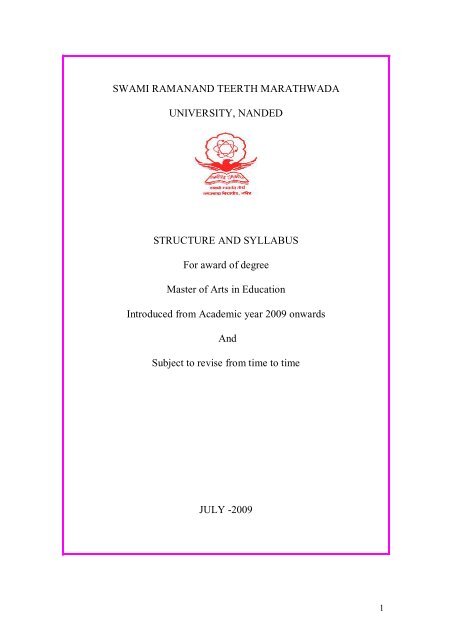
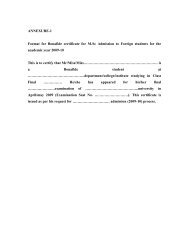

![Lokeh jkekuan rhFkZ ejkBokMk fo|kihB] ukan sM - - The Swami ...](https://img.yumpu.com/26553812/1/190x245/lokeh-jkekuan-rhfkz-ejkbokmk-fo-kihb-ukan-sm-the-swami-.jpg?quality=85)
